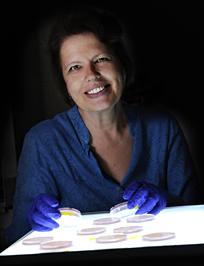Nullifying Norovirus
Remember that last case of food poisoning? Odds are it was caused by a nasty pathogen called a norovirus. NC State will use a $25 million grant from the U.S. Department of Agriculture to lead a national team of researchers studying what makes noroviruses tick and how they make you sick.
Human noroviruses are the most common cause of food-borne disease, responsible for more than 5 million cases in the United States each year. Noroviruses spread from person to person, through contaminated food or water, and by touching contaminated surfaces. Molluscan shellfish like oysters, clams and mussels, fresh produce and foods that are extensively handled just prior to consumption are at greatest risk for contamination.

Dr. Lee-Ann Jaykus, a professor in the Department of Food, Bioprocessing and Nutrition Sciences at NC State, is the lead investigator for the five-year project to study human noroviruses across the food supply chain and find effective control measures. The grant is USDA’s largest ever for food safety, according to U.S. Sen. Kay Hagan from North Carolina.
Virus Detectives
Human noroviruses are difficult to study because they cannot be cultivated outside of the human body, few commercial diagnostic tests are available in the United States and only a few scientists are trained specifically in food virology, Jaykus said.
“We anticipate this project will result in enhanced understanding, surveillance and control of food-borne human noroviruses, with the ultimate goal of reducing the burden of food-borne disease.”
Her group, called the USDA-National Institute of Food and Agriculture Food Virology Collaborative, consists of a team of more than 30 collaborators from academia, industry and government who will focus on objectives:
- Develop improved methods of studying human noroviruses and their role in food-borne illnesses.
- Develop and validate rapid and practical methods to detect human noroviruses.
- Collect and analyze data on viral food-borne illnesses—including how they are transmitted—and provide risk and cost analyses.
- Improve understanding of how human noroviruses behave in the food-safety chain in order to develop scientifically justifiable control measures
- Develop online courses and curricula for food safety and health professionals and food service workers, and provide information to fresh produce and shellfish producers and processors on the risks, management and control of food-borne viruses.
- Develop a public literature database, build virus research capabilities in state public health laboratories, and develop graduate-level curricula to educate masters and doctoral students trained in food virology.
Other NC State researchers involved in the project include Drs. Trevor Phister and David Green (food, bioprocessing and nutrition sciences); Orlin Velev (chemical and biomolecular engineering); Ben Chapman (4-H and youth development); Otto (Chip) Simmons (biological and agricultural engineering); and Chris Gunter (horticultural science).
In addition to NC State, which serves at the lead institution, the core team includes scientists from Clemson University, Baylor College of Medicine, Emory University, Research Triangle Institute, the U.S. Centers for Disease Control and Prevention, the University of Georgia, NC A&T State University, NC Central University, and the Institute for Food Safety and Health at Illinois Institute of Technology. Other key collaborators hail from the University of Delaware, Ohio State University, Louisiana State University, the U.S. FDA and USDA Agricultural Research Service, Arizona State University, New Mexico State University, Cincinnati Children’s Hospital and Rutgers University. Industrial and government stakeholders will serve as advisers.
- Categories:


